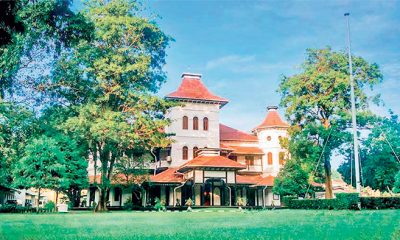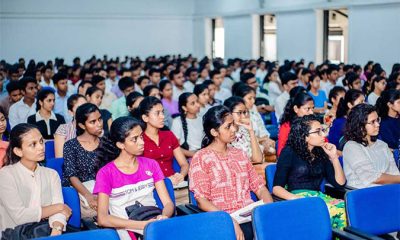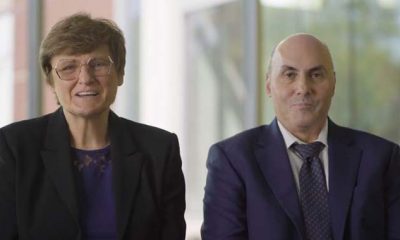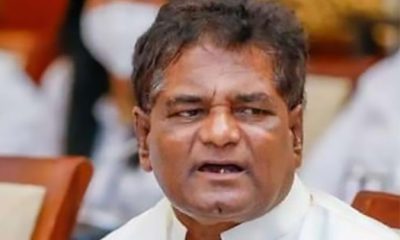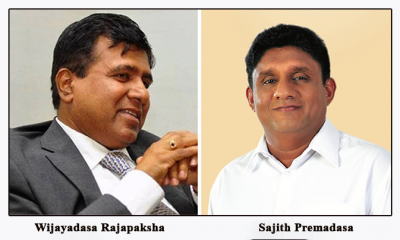Features
Origins and Achievements of Colombo Law Faculty

75th anniversary celebrations Sept. 22, 2023
by Dr. Dinesha Samararatne
I feel like an apology is in order as my opening line. A reflection on the 75 years of the Faculty of Law was to be shared by Justice Saleem Marsoof PC, who, unfortunately is not available to join us this evening. I stand here before you as a substitute challenged by the lack of the long and personal view of this institution and its graduates. Unlike Justice Marsoof, my association with it is relatively short. I am not aiming to be comprehensive, but I most certainly am aiming to offer you some thoughts to prompt your own reflections as we mark this significant milestone of an institution that is close to our hearts and one that has been central to the life of this nation.
The physical origin of the Faculty of Law, the College House, is the same as the origins of the University of Ceylon. It also happens to be a location from which at least aspects of the constitution of independent Ceylon were drafted. It is apt that the birth of the Faculty of Law is entangled with the political independence of this country. The Department of Law was established in July 1947 within the Faculty of Arts of the newly minted University of Ceylon.
The Department shifted to Peradeniya only in 1959. In 1965, it was relocated to Colombo and by 1967 it was upgraded as the first, and to date, only, Faculty of Law in Sri Lanka. By 1978, the Faculty of Law became a part of the newly established University of Colombo.
Early Days
It is a well-known fact that the first Vice Chancellor of the University of Ceylon, Sir Ivor Jennings was a key figure instrumental not only in the establishment of the then Department of Law alongside of Ceylon’s first University but that he also played a key role in drafting the independence constitution of Ceylon as well as of several other new states. Together with Sir Ivor Jennings who taught Constitutional Law Justice Francis Soertsz QC, Professor T Nadaraja and Justice (Dr) H W Tambiah QC were the illustrious founding academics of this new Department.
The first batch of graduates of the Department in 1950, were destined to be leading legal personalities of Sri Lanka. They were Mr RKW Goonesekere (who later served as a Principal of Sri Lanka Law College and a Chancellor of the University of Peradeniya), Mr Shiva Pasupati (who went on to serve as an Attorney General), Mr Ana Seneviratne (who was later the Inspector General of Police) and Mr Hema Rupasinghe (who went on to serve as a prominent Advocate).
The second batch of students were admitted directly to the Department of law and went on to serve in similarly significant public roles: namely Mr. Felix R. Dias Bandaranaike who took to politics and held office as a prominent Minister, Miss. Lakshmi Jayasundera (who later married Mr. Felix R. Dias Bandaranaike and who passed away recently), Mr. H.L. de Silva PC, a learned and erudite counsel, and Mr. Lakshman Kadirgamar PC, who worked as Director of WIPO before taking to politics and holding office as a Minister of Foreign Affairs. The Department of Law was the training ground for leaders of a new nation and arguably, remains so, to this date.
Graduating with a First Class
The first ever Bachelor of Laws (LL.B.) First Class honours pass was conferred on Mr. K. Shinya, of the third batch that graduated from the University of Ceylon, in 1952 who went on to become a prominent Advocate. The second First Class honours went to Mr. H.M.Z. Farouque, in 1960 and he went on to serve as the Registrar-General of Sri Lanka.
Men and women who graduated with First Class Honours from the Department of Law and subsequently the Faculty of Law reflect the exceptional quality of legal education and formation that this institution has had to offer. This honour roll includes Emeritus Prof. Savitri Goonesekere who as the first woman Vice Chancellor of the University of Colombo made a singular contribution nationally and internationally in law and policy making. I have had the honour of being a student of the last class she taught, before retirement from the faculty, in 2004 where Prof Goonesekere taught us the Law of Delict.
First class honours degrees were also awarded to Prof. L.J.M Cooray, Prof. Wickrema Weerasooria and Prof M Sornarajah, all of whom excelled in academia and distinguished themselves internationally, Justice Mark Fernando PC, one of the most illustrious justices of the Sri Lankan Supreme Court and Emeritus Professor GL Pieris, former Vice Chancellor of the University of Colombo and a former Minister of Constitutional Affairs.
More recently First-Class Honours degrees were awarded to Mr. Thusantha Wijemanne, a banker turned diplomat who also worked as a Director-General of the SAARC Arbitration Council, to Ms. Shermila Anthony who currently serves on the academic staff at the Faculty and to Dr Nishara Mendis who until recently also served on the academic staff.
Since 2010, more students graduated with First Class honours and include Ms Chathurika Akurgoda, Mr Supun Jaywardena, Dr Sachintha Dias, Ms Pramoda Vithange, Mr Minaal Wickremesinghe and just this year, Ms Shabnam Hilal and Mr Ishan Arachchi. Of the many significant achievements of these more recent graduates with First Class Honours, it is worth mentioning that Dr Sachintha Dias completed his D Phil at Oxford University and Mr Supun Jaywardena is the first ever law graduate with visual impairment in Sri Lanka to have achieved significant academic success and has recently returned to Sri Lanka after successfully reading for his Master’s degree at the University of Melbourne, Australia.
Illustrious Alumni
Over the course of its 75 year long history, graduates of this institution have achieved the highest levels of recognition not only in law but also in other spheres such as public service and politics. It is not possible to do justice to their service in this short speech and tonight, I can only name but a few of them. Graduates of international renown in academia include Prof CF Amerasinghe, Emeritus Professor Suri Ratnapala, Dr Neelan Tiruchelvam, Emeritus Professor Sharya Scharenguivel, Dr Nirmala Chandrahasan, Professor Deepika Udagama, Dr Mario Gomez, Mr Rohan Edrisinha, Dr Sharika Marasinghe and Prof Sumudu Atapattu.
Notable scholarly and professional contributions have been made by many of our graduates including Mr DC Amerasinghe, Mr Sriyan de Silva, Dr Sunil F Cooray, Ms Priyanee Wijesekere, Dr Rohan Perera PC, Dr Palitha Kohona, Dr Jayantha de Almeida PC and Ms Kishali Pinto Jaywardene. Esteemed members of the judiciary who graduated from the Faculty include Justice ARB Amerasinghe, Justice Mark Fernando PC, former Chief Justice Asoka de Silva, Justice Gamini Amaratunga, Justice Suresh Chandra, Justice Saleem Marsoof PC, Justice Eric Basnayake, first woman Justice of the Supreme Court of Sri Lanka and Sri Lanka’s first woman Chief Justice, Justice Dr Shirani Bandaranayake, Justice Chitrasiri, Justice Prasanna Jayawardene PC and currently, Justice Mahinda Samayawardhana.
One cannot but help but pause here to note the remarkable contribution made to Sri Lanka’s jurisprudence particularly in the 1990s by Justice ARB Amerasinghe, Justice Mark Fernando, Mr RKW Goonesekere and Mr HL de Silva. The jurisprudence thus developed was replicated to some extent more recently by Justice Prasanna Jayawardene. Today, the Faculty counts for the first time a head of state among its own, President Ranil Wickremesinghe.
There is no doubt that this institution has produced women and men who have served humanity well, whether in Sri Lanka or beyond. In my own work it has been wonderful to hear glowing reports about alumni of this institution often at leading institutions of the world such as Harvard University, Oxford University and at the United Nations. Annually, our graduates secure admission to the best law schools in the world, often securing prestigious scholarships.
It is customary and meaningful, when marking significant anniversaries of an institution, to name and celebrate the achievements and contributions of notable products of the institution. While we do that, in keeping with the emancipatory vision for university education in Sri Lanka, it is important to acknowledge the many other graduates who have also served well, in ensuring that legal systems function fairly and efficiently.
They may not be well known illustrious personalities but graduates of this institution who served professionally, ethically and generously to whoever who sought their services. In my view, it is in the ability of producing those types of graduates that the true test of the effectiveness or greatness of this institution is to be found.
On that score, let us acknowledge that this institution has served this land well. Could it have done better? I most certainly think so but it is fair to say that the emancipatory vision of universal education has been made available in our lecture halls for many, without any discrimination, over the years. It is fitting that this celebration tonight will contribute to that emancipatory dimension of this institution by providing support for undergraduates in financial need.
The faculty admits students from all parts of the country and from all walks of life. We have all experienced that min-cosmos of the Sri Lankan university where the generationally privileged student rubs shoulders with the generationally marginalised with strong prospects for transformation of the lives of both students through that encounter. For this emancipatory project to continue at this time of crisis, helping hands are essential. Our hope is that each of you will extend your generous support to our institution at this time and pay forward the support this land and its people extended to you, when you were pursuing your legal education as an undergraduate.
Student Life
Many of us hold and sweet and perhaps bitter-sweet memories of our formative days at University. This evening as we reconnect, our conversations will go back to the joys and horrors of our undergraduate days. Justice Marsoof, recollects his student life as an undergraduate in the second batch of students admitted to the newly established Faculty in 1968 in an essay published in Pursuing a Vision of Justice edited by Senaka Weeraratne, published in 2022. He notes that the faculty as a small place but, and I quote ‘hallowed portal of learning.’
Justice Marsoof notes that at the time of his admission to the Faculty of Law, they had two lecture halls with a small staff room adjoining the Science Faculty building on the main campus. The Law Faculty Library was then located across Reid Avenue. Today, the Faculty itself is on that same side of Reid Avenue and comprises two buildings. These two buildings house approximately 1,000 students and 40 academic staff.
Much has changed since the 1960s. The Bachelor of Laws degree which was originally offered as a three-year degree programme is now offered as a four-year programme thereby offering students extended opportunity for knowledge gathering, development of critical thinking and their overall formation. The latest revision of the curriculum is aimed at offering undergraduates more breadth in terms of course offerings and will be taught only in English.
From a Department of Law with a first batch of four students, over the course of 75 years, under the Deanships of Prof Nadarajah, Prof GL Peiris, Dr Anton Cooray, Prof Sharya Scharenguivel, Justice Dr Shirani Bandaranayake, Prof N Selvakkumaran, Prof VT Thamilmaran, Prof Indira Nanayakkara and presently Prof Sampath Punchihewa, this institution has evolved and grown in significant ways. In addition to the Bachelor of Laws degree for 350 students in a batch, the Faculty now also offers extension courses as well as postgraduate courses.
Co-curricular activities such as mooting offers students the opportunity to develop discipline specific as well as generic skills which they require for their professional development. It is a matter of pride for the Faculty that our students have often excelled in international mooting competitions even though the human and financial resources available to them are minimal.
Looking back to look forward
Marking a significant milestone of any institution, is a time for celebration, but I do think that our task would be incomplete, and even partial, if we do not pause to reflect critically on our institutional history in order to seek guidance for thinking meaningfully about our future.
The Faculty of Law was founded on, what I think, was an enduring vision that included at least three dimensions. The first was that of universal access to university education. The second is a commitment to developing critical thinking and excellence in legal education and the third is that of education as means for human flourishing and for developing democratic citizenship. Tonight as we celebrate the 75 years of this institution, it would be fitting for us to consider how well the Faculty and its graduates have realised this enduring vision.
On many occasions our graduates have fulfilled their professional and ethical responsibilities by defending constitutionalism, by ensuring respect for human rights and by working for the causes of the vulnerable and the voiceless. However, in 2023, when Sri Lanka seems to be standing again at cross-roads and is in crisis, we have an opportunity to ask ourselves about our responsibility for the state of the law, constitutionalism and respect for human dignity in Sri Lanka today.
I often try to imagine what the 1940s was like for the Ceylonese. A new state was being formed in the wake of two world wars and the collapse of an Empire on which the sun was never expected to set. Surely it must have been a tumultuous time. In 2023, as we mark 75 years of the Faculty of Law, we are once again in a tumultuous time. Visionary leaders of the 1940s laid a foundation for an institution in which they imagined a better collective future for us, despite the turbulence and uncertainty of their time. We, in 2023, face severe challenges in continuing quality universal education and higher education, in preserving the rule of law and in ensuring respect for human dignity.
Our challenge today, is twofold: to preserve the founding vision of this institution and to adapt it to deal with the new challenges that we face. I think it is fitting that the 75th anniversary of this institution is synchronised with the 75th anniversary of the Sri Lankan state. It is a powerful reminder of the responsibility and promise of this institution and of yours and mine, as its alumni. How we fulfil that responsibility and realise its promise in the next 75 years, is up to us and history, as always, will be our judge.
Features
The heart-friendly health minister

by Dr Gotabhya Ranasinghe
Senior Consultant Cardiologist
National Hospital Sri Lanka
When we sought a meeting with Hon Dr. Ramesh Pathirana, Minister of Health, he graciously cleared his busy schedule to accommodate us. Renowned for his attentive listening and deep understanding, Minister Pathirana is dedicated to advancing the health sector. His openness and transparency exemplify the qualities of an exemplary politician and minister.
Dr. Palitha Mahipala, the current Health Secretary, demonstrates both commendable enthusiasm and unwavering support. This combination of attributes makes him a highly compatible colleague for the esteemed Minister of Health.
Our discussion centered on a project that has been in the works for the past 30 years, one that no other minister had managed to advance.
Minister Pathirana, however, recognized the project’s significance and its potential to revolutionize care for heart patients.
The project involves the construction of a state-of-the-art facility at the premises of the National Hospital Colombo. The project’s location within the premises of the National Hospital underscores its importance and relevance to the healthcare infrastructure of the nation.
This facility will include a cardiology building and a tertiary care center, equipped with the latest technology to handle and treat all types of heart-related conditions and surgeries.
Securing funding was a major milestone for this initiative. Minister Pathirana successfully obtained approval for a $40 billion loan from the Asian Development Bank. With the funding in place, the foundation stone is scheduled to be laid in September this year, and construction will begin in January 2025.
This project guarantees a consistent and uninterrupted supply of stents and related medications for heart patients. As a result, patients will have timely access to essential medical supplies during their treatment and recovery. By securing these critical resources, the project aims to enhance patient outcomes, minimize treatment delays, and maintain the highest standards of cardiac care.
Upon its fruition, this monumental building will serve as a beacon of hope and healing, symbolizing the unwavering dedication to improving patient outcomes and fostering a healthier society.We anticipate a future marked by significant progress and positive outcomes in Sri Lanka’s cardiovascular treatment landscape within the foreseeable timeframe.
Features
A LOVING TRIBUTE TO JESUIT FR. ALOYSIUS PIERIS ON HIS 90th BIRTHDAY

by Fr. Emmanuel Fernando, OMI
Jesuit Fr. Aloysius Pieris (affectionately called Fr. Aloy) celebrated his 90th birthday on April 9, 2024 and I, as the editor of our Oblate Journal, THE MISSIONARY OBLATE had gone to press by that time. Immediately I decided to publish an article, appreciating the untiring selfless services he continues to offer for inter-Faith dialogue, the renewal of the Catholic Church, his concern for the poor and the suffering Sri Lankan masses and to me, the present writer.
It was in 1988, when I was appointed Director of the Oblate Scholastics at Ampitiya by the then Oblate Provincial Fr. Anselm Silva, that I came to know Fr. Aloy more closely. Knowing well his expertise in matters spiritual, theological, Indological and pastoral, and with the collaborative spirit of my companion-formators, our Oblate Scholastics were sent to Tulana, the Research and Encounter Centre, Kelaniya, of which he is the Founder-Director, for ‘exposure-programmes’ on matters spiritual, biblical, theological and pastoral. Some of these dimensions according to my view and that of my companion-formators, were not available at the National Seminary, Ampitiya.
Ever since that time, our Oblate formators/ accompaniers at the Oblate Scholasticate, Ampitiya , have continued to send our Oblate Scholastics to Tulana Centre for deepening their insights and convictions regarding matters needed to serve the people in today’s context. Fr. Aloy also had tried very enthusiastically with the Oblate team headed by Frs. Oswald Firth and Clement Waidyasekara to begin a Theologate, directed by the Religious Congregations in Sri Lanka, for the contextual formation/ accompaniment of their members. It should very well be a desired goal of the Leaders / Provincials of the Religious Congregations.
Besides being a formator/accompanier at the Oblate Scholasticate, I was entrusted also with the task of editing and publishing our Oblate journal, ‘The Missionary Oblate’. To maintain the quality of the journal I continue to depend on Fr. Aloy for his thought-provoking and stimulating articles on Biblical Spirituality, Biblical Theology and Ecclesiology. I am very grateful to him for his generous assistance. Of late, his writings on renewal of the Church, initiated by Pope St. John XX111 and continued by Pope Francis through the Synodal path, published in our Oblate journal, enable our readers to focus their attention also on the needed renewal in the Catholic Church in Sri Lanka. Fr. Aloy appreciated very much the Synodal path adopted by the Jesuit Pope Francis for the renewal of the Church, rooted very much on prayerful discernment. In my Religious and presbyteral life, Fr.Aloy continues to be my spiritual animator / guide and ongoing formator / acccompanier.
Fr. Aloysius Pieris, BA Hons (Lond), LPh (SHC, India), STL (PFT, Naples), PhD (SLU/VC), ThD (Tilburg), D.Ltt (KU), has been one of the eminent Asian theologians well recognized internationally and one who has lectured and held visiting chairs in many universities both in the West and in the East. Many members of Religious Congregations from Asian countries have benefited from his lectures and guidance in the East Asian Pastoral Institute (EAPI) in Manila, Philippines. He had been a Theologian consulted by the Federation of Asian Bishops’ Conferences for many years. During his professorship at the Gregorian University in Rome, he was called to be a member of a special group of advisers on other religions consulted by Pope Paul VI.
Fr. Aloy is the author of more than 30 books and well over 500 Research Papers. Some of his books and articles have been translated and published in several countries. Among those books, one can find the following: 1) The Genesis of an Asian Theology of Liberation (An Autobiographical Excursus on the Art of Theologising in Asia, 2) An Asian Theology of Liberation, 3) Providential Timeliness of Vatican 11 (a long-overdue halt to a scandalous millennium, 4) Give Vatican 11 a chance, 5) Leadership in the Church, 6) Relishing our faith in working for justice (Themes for study and discussion), 7) A Message meant mainly, not exclusively for Jesuits (Background information necessary for helping Francis renew the Church), 8) Lent in Lanka (Reflections and Resolutions, 9) Love meets wisdom (A Christian Experience of Buddhism, 10) Fire and Water 11) God’s Reign for God’s poor, 12) Our Unhiddden Agenda (How we Jesuits work, pray and form our men). He is also the Editor of two journals, Vagdevi, Journal of Religious Reflection and Dialogue, New Series.
Fr. Aloy has a BA in Pali and Sanskrit from the University of London and a Ph.D in Buddhist Philosophy from the University of Sri Lankan, Vidyodaya Campus. On Nov. 23, 2019, he was awarded the prestigious honorary Doctorate of Literature (D.Litt) by the Chancellor of the University of Kelaniya, the Most Venerable Welamitiyawe Dharmakirthi Sri Kusala Dhamma Thera.
Fr. Aloy continues to be a promoter of Gospel values and virtues. Justice as a constitutive dimension of love and social concern for the downtrodden masses are very much noted in his life and work. He had very much appreciated the commitment of the late Fr. Joseph (Joe) Fernando, the National Director of the Social and Economic Centre (SEDEC) for the poor.
In Sri Lanka, a few religious Congregations – the Good Shepherd Sisters, the Christian Brothers, the Marist Brothers and the Oblates – have invited him to animate their members especially during their Provincial Congresses, Chapters and International Conferences. The mainline Christian Churches also have sought his advice and followed his seminars. I, for one, regret very much, that the Sri Lankan authorities of the Catholic Church –today’s Hierarchy—- have not sought Fr.
Aloy’s expertise for the renewal of the Catholic Church in Sri Lanka and thus have not benefited from the immense store of wisdom and insight that he can offer to our local Church while the Sri Lankan bishops who governed the Catholic church in the immediate aftermath of the Second Vatican Council (Edmund Fernando OMI, Anthony de Saram, Leo Nanayakkara OSB, Frank Marcus Fernando, Paul Perera,) visited him and consulted him on many matters. Among the Tamil Bishops, Bishop Rayappu Joseph was keeping close contact with him and Bishop J. Deogupillai hosted him and his team visiting him after the horrible Black July massacre of Tamils.
Features
A fairy tale, success or debacle

Sri Lanka-Singapore Free Trade Agreement
By Gomi Senadhira
senadhiragomi@gmail.com
“You might tell fairy tales, but the progress of a country cannot be achieved through such narratives. A country cannot be developed by making false promises. The country moved backward because of the electoral promises made by political parties throughout time. We have witnessed that the ultimate result of this is the country becoming bankrupt. Unfortunately, many segments of the population have not come to realize this yet.” – President Ranil Wickremesinghe, 2024 Budget speech
Any Sri Lankan would agree with the above words of President Wickremesinghe on the false promises our politicians and officials make and the fairy tales they narrate which bankrupted this country. So, to understand this, let’s look at one such fairy tale with lots of false promises; Ranil Wickremesinghe’s greatest achievement in the area of international trade and investment promotion during the Yahapalana period, Sri Lanka-Singapore Free Trade Agreement (SLSFTA).
It is appropriate and timely to do it now as Finance Minister Wickremesinghe has just presented to parliament a bill on the National Policy on Economic Transformation which includes the establishment of an Office for International Trade and the Sri Lanka Institute of Economics and International Trade.
Was SLSFTA a “Cleverly negotiated Free Trade Agreement” as stated by the (former) Minister of Development Strategies and International Trade Malik Samarawickrama during the Parliamentary Debate on the SLSFTA in July 2018, or a colossal blunder covered up with lies, false promises, and fairy tales? After SLSFTA was signed there were a number of fairy tales published on this agreement by the Ministry of Development Strategies and International, Institute of Policy Studies, and others.
However, for this article, I would like to limit my comments to the speech by Minister Samarawickrama during the Parliamentary Debate, and the two most important areas in the agreement which were covered up with lies, fairy tales, and false promises, namely: revenue loss for Sri Lanka and Investment from Singapore. On the other important area, “Waste products dumping” I do not want to comment here as I have written extensively on the issue.
1. The revenue loss
During the Parliamentary Debate in July 2018, Minister Samarawickrama stated “…. let me reiterate that this FTA with Singapore has been very cleverly negotiated by us…. The liberalisation programme under this FTA has been carefully designed to have the least impact on domestic industry and revenue collection. We have included all revenue sensitive items in the negative list of items which will not be subject to removal of tariff. Therefore, 97.8% revenue from Customs duty is protected. Our tariff liberalisation will take place over a period of 12-15 years! In fact, the revenue earned through tariffs on goods imported from Singapore last year was Rs. 35 billion.
The revenue loss for over the next 15 years due to the FTA is only Rs. 733 million– which when annualised, on average, is just Rs. 51 million. That is just 0.14% per year! So anyone who claims the Singapore FTA causes revenue loss to the Government cannot do basic arithmetic! Mr. Speaker, in conclusion, I call on my fellow members of this House – don’t mislead the public with baseless criticism that is not grounded in facts. Don’t look at petty politics and use these issues for your own political survival.”
I was surprised to read the minister’s speech because an article published in January 2018 in “The Straits Times“, based on information released by the Singaporean Negotiators stated, “…. With the FTA, tariff savings for Singapore exports are estimated to hit $10 million annually“.
As the annual tariff savings (that is the revenue loss for Sri Lanka) calculated by the Singaporean Negotiators, Singaporean $ 10 million (Sri Lankan rupees 1,200 million in 2018) was way above the rupees’ 733 million revenue loss for 15 years estimated by the Sri Lankan negotiators, it was clear to any observer that one of the parties to the agreement had not done the basic arithmetic!
Six years later, according to a report published by “The Morning” newspaper, speaking at the Committee on Public Finance (COPF) on 7th May 2024, Mr Samarawickrama’s chief trade negotiator K.J. Weerasinghehad had admitted “…. that forecasted revenue loss for the Government of Sri Lanka through the Singapore FTA is Rs. 450 million in 2023 and Rs. 1.3 billion in 2024.”
If these numbers are correct, as tariff liberalisation under the SLSFTA has just started, we will pass Rs 2 billion very soon. Then, the question is how Sri Lanka’s trade negotiators made such a colossal blunder. Didn’t they do their basic arithmetic? If they didn’t know how to do basic arithmetic they should have at least done their basic readings. For example, the headline of the article published in The Straits Times in January 2018 was “Singapore, Sri Lanka sign FTA, annual savings of $10m expected”.
Anyway, as Sri Lanka’s chief negotiator reiterated at the COPF meeting that “…. since 99% of the tariffs in Singapore have zero rates of duty, Sri Lanka has agreed on 80% tariff liberalisation over a period of 15 years while expecting Singapore investments to address the imbalance in trade,” let’s turn towards investment.
Investment from Singapore
In July 2018, speaking during the Parliamentary Debate on the FTA this is what Minister Malik Samarawickrama stated on investment from Singapore, “Already, thanks to this FTA, in just the past two-and-a-half months since the agreement came into effect we have received a proposal from Singapore for investment amounting to $ 14.8 billion in an oil refinery for export of petroleum products. In addition, we have proposals for a steel manufacturing plant for exports ($ 1 billion investment), flour milling plant ($ 50 million), sugar refinery ($ 200 million). This adds up to more than $ 16.05 billion in the pipeline on these projects alone.
And all of these projects will create thousands of more jobs for our people. In principle approval has already been granted by the BOI and the investors are awaiting the release of land the environmental approvals to commence the project.
I request the Opposition and those with vested interests to change their narrow-minded thinking and join us to develop our country. We must always look at what is best for the whole community, not just the few who may oppose. We owe it to our people to courageously take decisions that will change their lives for the better.”
According to the media report I quoted earlier, speaking at the Committee on Public Finance (COPF) Chief Negotiator Weerasinghe has admitted that Sri Lanka was not happy with overall Singapore investments that have come in the past few years in return for the trade liberalisation under the Singapore-Sri Lanka Free Trade Agreement. He has added that between 2021 and 2023 the total investment from Singapore had been around $162 million!
What happened to those projects worth $16 billion negotiated, thanks to the SLSFTA, in just the two-and-a-half months after the agreement came into effect and approved by the BOI? I do not know about the steel manufacturing plant for exports ($ 1 billion investment), flour milling plant ($ 50 million) and sugar refinery ($ 200 million).
However, story of the multibillion-dollar investment in the Petroleum Refinery unfolded in a manner that would qualify it as the best fairy tale with false promises presented by our politicians and the officials, prior to 2019 elections.
Though many Sri Lankans got to know, through the media which repeatedly highlighted a plethora of issues surrounding the project and the questionable credentials of the Singaporean investor, the construction work on the Mirrijiwela Oil Refinery along with the cement factory began on the24th of March 2019 with a bang and Minister Ranil Wickremesinghe and his ministers along with the foreign and local dignitaries laid the foundation stones.
That was few months before the 2019 Presidential elections. Inaugurating the construction work Prime Minister Ranil Wickremesinghe said the projects will create thousands of job opportunities in the area and surrounding districts.
The oil refinery, which was to be built over 200 acres of land, with the capacity to refine 200,000 barrels of crude oil per day, was to generate US$7 billion of exports and create 1,500 direct and 3,000 indirect jobs. The construction of the refinery was to be completed in 44 months. Four years later, in August 2023 the Cabinet of Ministers approved the proposal presented by President Ranil Wickremesinghe to cancel the agreement with the investors of the refinery as the project has not been implemented! Can they explain to the country how much money was wasted to produce that fairy tale?
It is obvious that the President, ministers, and officials had made huge blunders and had deliberately misled the public and the parliament on the revenue loss and potential investment from SLSFTA with fairy tales and false promises.
As the president himself said, a country cannot be developed by making false promises or with fairy tales and these false promises and fairy tales had bankrupted the country. “Unfortunately, many segments of the population have not come to realize this yet”.
(The writer, a specialist and an activist on trade and development issues . )


